Whether you’re actively trying to get pregnant (or hoping you do not have a plus sign on that pregnancy test, it can be nerve-wracking to wait it out to get a clear result. Wondering whether or not you’re pregnant, no matter which side of the line you’re on, can take up quite a bit of energy, and it can be helpful to know the first signs of pregnancy so you know what to look out for.
Whether you’re in the “trying to be pregnant” camp or the “not trying to be pregnant” camp, it’s often better to have a clear answer sooner rather than later. For that reason, we spoke to doctors about what symptoms most might indicate an early pregnancy.
Keep in mind that every person every person is different in terms of what combination of symptoms they may or may not feel during early pregnancy, says Dr. Grace Kong, an OB-GYN at Saddleback Memorial Medical Center in Laguna Hills, California. Not only that, but each pregnancy can have different symptoms in the same individual, if you’ve had more than one pregnancy, she added. So just because you didn’t get morning sickness while pregnant with your first child, that may not be the case with the second.
Here are a few early signs of pregnancy — and some advice on when to visit your doctor.
Missed period
We’ll start with the most obvious: the missed or late period, which is what prompts most people to take a home pregnancy test. If it’s positive, make an appointment with your doctor.
If it’s positive and you’re experiencing any unusual symptoms, like severe pain or heavy bleeding, Kong tells SheKnows that you should be evaluated by a doctor right away to make sure there isn’t a concern for abnormal pregnancy, such as an ectopic pregnancy or a miscarriage.
“As long as the patient is ‘low-risk’ — not on prescription medications, no history of medical problems and no complications with prior pregnancies — then it is best to see a doctor around 6 to 8 weeks of pregnancy,” Dr. Elizabeth West, an OB-GYN at Miller Children’s & Women’s Hospital in Long Beach, California, tells SheKnows.
But West advises that any patients with medical problems or other issues should see their doctor earlier to ensure they are doing everything they can to optimize the pregnancy.
Breast tenderness
Both Kong and West say that increased breast tenderness and swelling could be an early sign of pregnancy. Of course, fluctuating hormones can cause changes in your breasts throughout the month, and they might feel sensitive right before your period. But if you feel more breast soreness, it might be a signal of something more.
Increased urination
As pregnancy goes on, people often find themselves peeing more frequently due to pressure from the uterus on the bladder, but this can happen in very early pregnancy as well. Your body circulates more blood during pregnancy, per the Mayo Clinic and the kidneys process more fluid, which filters through your bladder and causes you to pee more often.
Headaches and dizziness
Another very early pregnancy symptom could be headaches and dizziness. This also can happen because of the increased circulation of blood, compounded by the hormonal changes of early pregnancy, the Cleveland Clinic reports. If you feel lightheaded often, it might be time to take a pregnancy test.
Fatigue
Sure, we’re all tired all the time, but if you’re feeling extra tired and can’t figure out why, it could be an early symptom of pregnancy, which Kong says may present very early on. In fact, as West points out, the fatigue could set in before you’ve even missed your period.
Nausea
As pregnancy hormones increase, it may result in nausea or vomiting, Kong says. According to West, this phase of pregnancy typically happens five to six weeks after conception, and despite being called “morning sickness,” it can occur at any time of day or night.
Aversion to foods and/or smells
Some patients experience food aversions and sensitivity to odors very early in pregnancy, West explains. So if you’re normally all about the smell of garlic but all of a sudden it makes you sick, that might be a sign.
Bleeding & cramps
Yes, this sounds a lot like a period, but it’s not. Called implantation bleeding, a small amount of spotting and cramps can occur as the embryo implants into the uterine lining, according to Kong. You may experience bloating, too. It may happen around the same time as your regular menstrual period, but the bleeding will typically be much lighter.
When in doubt, there’s no harm in doing a quick at-home pregnancy test. No one likes peeing on a stick, but it’s totally worth it to put your mind at ease.
Need to re-up some of your sexual health supplies at home? You can do it at Costco:

Source: Read Full Article

